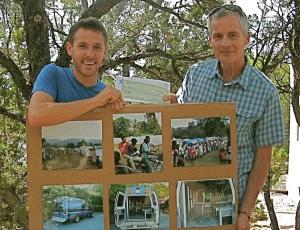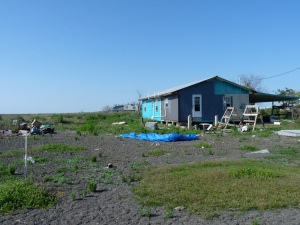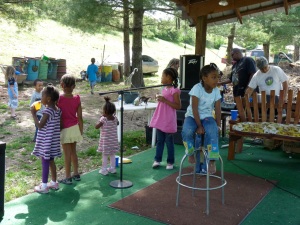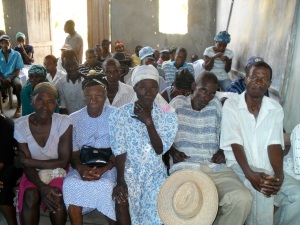Stories from the Gulf, one year on
By CNN staff*
CNN
April 20, 2011
URL: http://www.cnn.com/2011/US/04/20/oil.spill.year.later/
(CNN) — A daughter will walk down the aisle this year without her father. A rig survivor still awakens at night and screams. A Native American tribe in Louisiana now eats pork, chicken and beans instead of oysters and crab.
And the voice of a Cajun musician puts everything into perspective about last year’s oil spill. For years, Tab Benoit had strummed a dire tune of the pillaging of Louisiana’s coast.
“Before all this, you’d try to warn people about problems that were coming, and they’d think you’re a conspiracy theorist,” he says. “The blowout wasn’t a mystery. … It’s not like it was a surprise, ya’ know.”
A year into the nation’s worst oil disaster, BP has launched a public-elations campaign about “making it right.” In a 20-minute video released on the company’s website, group Chef Eecutive Bob Dudley sits at a polished wood table and says the disaster is a “tragedy we deeply regret at BP.”
“In everything we’ve done since that day, we’ve tried to act as a responsible company should,” he says. “I know it will take time to win back people’s respect and it will take actions rather than words. But I hope this helps to demonstrate that we are sorry, that we learned the lessons and we are committed to earning back your trust.”
The video then chronicles BP’s efforts to contain the spill in the days, weeks,and months following the April 20, 2010, explosion on the Deepwater Horizon offshore drilling platform.
The plume of crude billowing into the Gulf of Mexico has stopped, and images of oil-soaked birds have subsided. But take a closer look at the Gulf region and you’ll find shattered lives and angry — yet determined — residents.
“One day at a time”
About 50 friends and family members of chief driller Dewey Revette gathered this past Sunday for a fish fry in Mississippi. It was the first time everyone had been together since he and 10 others were killed in the explosion.
“Just wishing that Dewey was there,” says Sherri Revette, his wife of 26 years. Little things like cleaning the gutters or buying a lawnmower became monumental tasks over the last year. “I don’t know what to do,” Sherri says.
And signs of life continue all around. Their first grandchild is due June 30. The boy will be named Dewey.
“I have to try to figure out a way to be excited and not sad,” Sherri says. “That was one of our main dreams, and he wanted a grandson so bad.”
Their youngest daughter, Alicia, always hoped her dad would walk her down the aisle. This October, she’ll be getting married.
“It’s going to be hard,” Sherri says, “on the happiest day of her life, knowing her father’s not going to be there.”
After Sunday’s fish fry, Sherri took friends and relatives to a nearby cemetery where a headstone for Dewey rests. On the back, there’s an image of Deepwater Horizon “so 100 years from now, the next generations will remember that Dewey was one of the 11 on the rig.”
“He’s missed, and I’m just taking it one day at a time,” she says. “We lost 11 good men that shouldn’t have been lost.” She repeats: “It should never have happened.”
The nightmare won’t leave
Matthew Jacobs wakes up screaming in the middle of the night. He was among the 115 survivors of Deepwater Horizon. “It’s something that I just can’t get out of my head,” he says. Every day, he thinks about his 11 colleagues killed on the rig.
“My mind goes right back to the drill floor,” he says, “and the 11 men.” According to his medical records, Jacobs has been diagnosed with post-traumatic stress disorder, and he takes medication for depression, sleep problems, and other issues. He visits psychologists regularly. He says he’s undergone 10 weeks of physical therapy for bulging discs in his back.
“It’s basically changed my life completely since this happened,” he says. “Certain things I don’t do because I just don’t feel comfortable. I love fishing and I just don’t feel comfortable doing it because it’s on the water. I’m really claustrophobic now and I feel it every time I get in the elevator.”
Jacobs is still an employee of Transocean, which owned the Deepwater Horizon [drilling rig], but hasn’t worked on a rig since the disaster. He says he’ll never work offshore again. He’s suing Transocean for pain and suffering and loss of wages.
At the end of last year, when Transocean gave bonuses to employees and touted a stellar safety year, Jacobs says, “It made me sick to my stomach.” Transocean later apologized for its handling of the bonuses, and five top executives said they would donate their safety bonuses to the families of the 11 workers killed.
What happened on April 20, 2010, Jacobs says, will forever be with him.
“You have to live your life now taking medicine every day to try to keep the nightmares from coming back,” he says. “It’s always in the back of your mind, and I think about it every day.”
Avoiding oysters for a year
In the Louisiana marshes, members of the Pointe Aux Chenes Indian Tribe say the spill has affected everything.
“It changed our way of life for sure,” says tribe member Theresa Dardar. “We’re not eating like we usually eat.”
The nearby marshes are still slickened with oil, she says.
The tribe is made up of about 700 members whose ancestors were forced from their lands and resettled to Louisiana more than 100 years ago. Coastal erosion had already hit the tribe hard. Then the spill hit.
Her family used to eat seafood every day. Now, they eat shrimp only on Fridays. The rest of the week, it’s chicken, pork and beans.
She says she hasn’t had an oyster since “before the spill.” That especially hurts because she longs for the oysters of the past.
“We love fresh oysters,” she says. “My husband even more so. He was tempted to get some recently, but he said no, he wouldn’t take a chance.”
Dardar says the tribe had independent tests conducted on local shrimp, oysters and crab — and the results showed some were tainted. “We don’t trust the tests that the state and federal governments did.”
The Food and Drug Administration and the National Oceanic and Atmospheric Administration have consistently said thousands of tests “prove Gulf seafood is safe from oil and dispersant contamination.”
Her anger, Dardar says, is directed straight at BP.
“I’ve become angry”Read More















